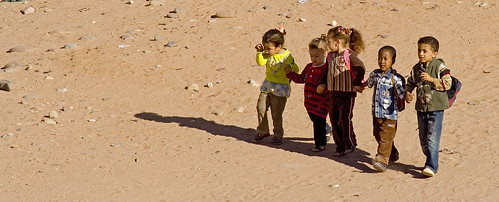 Amidst nationwide calls for education reforms, a recent attempt at a language change in Morocco’s classrooms has been blocked by the Moroccan government. Moroccan students are taught in Classical Arabic (Fus’ha), while some students are also taught in French. However, the common Arabic dialect of Morocco is Darija, a combination of Arabic, French, Spanish and Amizigh, or Berber dialects. Children grow up speaking Darija in their homes and are confused when they have to make a sudden switch to Fus’ha once they enter school.
Amidst nationwide calls for education reforms, a recent attempt at a language change in Morocco’s classrooms has been blocked by the Moroccan government. Moroccan students are taught in Classical Arabic (Fus’ha), while some students are also taught in French. However, the common Arabic dialect of Morocco is Darija, a combination of Arabic, French, Spanish and Amizigh, or Berber dialects. Children grow up speaking Darija in their homes and are confused when they have to make a sudden switch to Fus’ha once they enter school.
Fus’ha is constitutionally defined as the official language of the state: government correspondence, most TV programs, newspapers, and school lectures (until college, where lectures are in French or English) are all conducted in it. However, Darija is the language social life is dictated by. Defining Fus’ha as the official language is a part of the “Arabisation” policy adopted by the Moroccan regime right after independence from France in 1956.
Since the early 2000s, Moroccan intellectual and advisors have been calling for the establishment of Darija as a “national language.” Most recently, Noureddine Ayouch, a prominent Moroccan businessman and civil society activist, has been touting the benefits of using Darija as the teaching language in classrooms. In an international conference on education held in October of 2013, Ayouch invited a group of policymakers to discuss this idea: He claimed that it would in fact help students learn Fus’ha because they would be learning it in their native tongue.
The conference received a largely negative reaction from Moroccan government officials on both sides of the political spectrum. Islamist Parliament Member (MP) Moqri Abouzayd described the proposal as an “imperialist attempt to destroy Islam.” Socialist MP Rachida Benmassoud claimed the idea was “historically and significantly irrelevant.”
Many claim that Moroccan’s linguistic divide is linked to its socioeconomic divide: Darija is for the proletariat, French and English for the upper classes, and Fus’ha for the state. Because of this, any attempt to change the country’s linguistic status quo is met with resistance of some sort, creating a stalemate and halting progress.
Creative Commons Love: Vince Millett on Flickr.com
Written by Aanchal Narang
